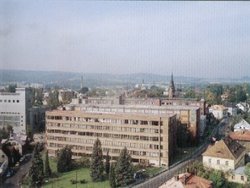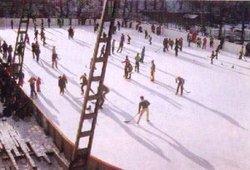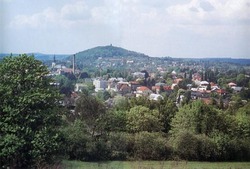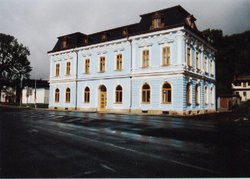|
|
History in Dates
-
 |
The old church, vicarage and school
in 1719, the place of today’s square
|
 |
| Varnsdorf in 1821
|
 |
Weekly Fair – 1870
|
 |
The view of the square
from present National Street in 1898
|
 |
The flyover of the airship Sachsen
on 7th March 1903 at 10:00 a.m.
|
 |
The view of the town from
Hrádek hill (1904)
|
 |
The Restaurant on Špičák hill
|
 |
House No. 498, National St. –
former Fölich, now the
Commercial Bank
|
 |
Hrádek (Burgsberg)
|
 |
| Elite Varnsdorf
|
 |
Ice rink
|
 |
Panorama of Varnsdorf
|
 |
Border crossing to Germany after the reconstruction
| 1357
- The oldest known written record about Varnsdorf until now
- 1494
- Under the reign of Henry of Šlejnic, Varnsdorf gets the brewing right, the right of capital punishment, the right to store grain, the right of free commerce and trade, and the right to sell salt.
- 1535
- Varnsdorf accepts Lutheranism
- 1611
- King Matthew goes through Varnsdorf on his journey to Bautzen.
- 1618-1681
- The owners are often alternating in connection with their religious denomination.
- 1641-1648,
- The town suffers from the presence of Swede corps.
- 1648
- The evidence of manufacturing white and striped yarn linen appears.
- 1771
- Damask manufacture begins.
- 1777
- The construction of St. Paul’s and Peter’s Dean Church has been completed.
- 1794
- The new school has been built.
- 1801
- The flying shuttle is used in weaving cotton.
- 1804
- The first steam engine starts working, and the Emperor Franz II offers the status of a town to Old Varnsdorf, but the council does not accept.
- 1819
- The first printing cylinder for printed cotton has been installed.
- 1829
- A huge fire of the Burza (Stock Market) building, neighbouring buildings, and the church tower causes melting of the church bells.
- 1830
- The worlwide first complete liturgy performance of Beethoven’s Missa Solemnis (ceremonial mass) takes its plce in the St. Paul’s and Peter’s Church.
- 1839
- The roads to Rumburk via Studánka and to Dolní Podluží have been finished. The latter one enabled connection wth the interior of Bohemia.
- 1847
- Archduke Franz Josef, later Emperor Franz Josef I, is visiting Varnsdorf.
- 1849
- Old Varnsdorf and five surrounding villages unite into one village called Varnsdorf.
- 1850
- The County Court has been established in Varnsdorf.
- 1851
-
- Gendarme post established in Varnsdorf.
- 1859
- The railway track Zittau – Liberec has been opened.
- 1863
- The Voluntary Fire Squad has been established.
(Freiwillige Turner Feuerwehr)
- 1868
- With the Supreme Decree of His Apostolic Majesty Franz Josef I ,on 28th July, Varnsdorf is declared a town28.
- 1871
- With finishing the railway track Grosschönau – Varnsdorf the Varnsdorf railway station becomes an intersection of the Austrian and Saxon railways.
- 1872-1874
- The Old Catholic Church has been built in New Romanesque art.
- 1879
- The Public Library has been established.
- 1897
- There was a flood on 28th July, the first car driven by a petrol consumption engine goes through Varnsdorf.
- 1900
- The biggest strike of textile factory workers before the World War I.
- 1905
- The Evangelic Church is consecrated on 3rd December. The church is heated with hot air.
- 1911
- St. Charles’ Church construction is started, the church is consecrated the next year, but the building itself remains unfinished / without a tower.
- 1914-1918
- The World War I brings food shortage, difficult supply, the Town Council opens diners for catering the citizens of the town, and issues its own makeshift currency.
- 1919
- The Czech school that is later moved to today’s Erben Street is established in spite of the predominantly German Town Council’s obstacles.
- 1920
- The martial law is proclaimed and lasts until 1921, probably because of smuggling, plundering, and demonstrations against bad supply of the town.
- 1922
- There are very high prices in Varnsdorf, the chronicles say the highest ones in the Czechoslovak Republic.
- 1923
- There are 5,500 unemployed in the District of Varnsdorf.
- 1930
- The census shows that from 22,793 inhabitants there live 1,512 Czech people.
- 1932-1934
- Varnsdorf intensively suffers from the results of the world - wide depression.
- 1939-1945
- World War II does not reach Varnsdof with direct war operations, and the town is not bombed either.
- 1942
- The assembly hall that was very rich in decoration burns down during a huge fire of the Town Hall. The asembly hall in its original appearance has never been rebuilt.
- 1945
- On 9th May at 10:00 a.m. the first squad of the Red Army arrives at the square in Varnsdorf. The streets are given new names. The Varnsdorf Philharmonic Orchestra is established.
- 1949
- After administrative reorganisation from provincial to county administrative division Varnsdorf is in the district of Rumburk and in the county of Liberec. The bus connection with Liberec is begun.
- 1954
- The Czechoslovak Television broadcast is recieved in Varnsdorf for the first time.
- 1959
- After reorganisation and specialisation of health service there remain paediatrics, orthopaedics, and gynaecologic hospital wards, and a maternity hospital in Varnsdorf.
- 1960
- The policlinics is opened in Varnsdorf.
- 1961
- After another administrative reorganisation Varnsdorf belongs to the district of Děčín and to the County North Bohemia.
- 1967
- The border crossing Varnsdorf – Seifhennersdorf is opened.
- 1968
- After the August occupation of Czechoslovakia by the armies of the Warsaw Pact the border crossing to the German Democratic Republic is closed.
- 1970
- The border crossing is opened again, first for haulage only, later for tourists too.
- 1974
- A new fabric- finishing factory of the Velveta national company is opened.
- 1978
- The border crossing is given the status of an international long distance crossing of the first category to all states all over the world. A huge fire seriously damaged the new fabric-finishing factory.
- 1980
- The village of Studánka is administratively connected to Varnsdorf. A health centre for children is opened in house No. 1254.
- 1986
-
- The construction of the ice rink with artificial ice has been finished.
- 1987
- The sports arena, pensioners’ house with nurse care, and the bus terminal are built and opened.
- 1988
- The amphitheatre of the school in Střelecká Street is reconstructed and opened as the most beautiful concert hall far and near. A hostel for workers with 173 beds is opened too.
- 1989
- A new school building is built and opened in Edison Street.
- 1990
- A plenary meeting of the Town Council takes its place at the Panorama Cinema on 5th January. New members of the Town National Committee Council are adopted by acclamation of the citizens, then a new Town Council is elected by popular vote. The first issue of the local weekly Hlas Severu (The Voice of the North) that used to be issued in the sixties comes to the newsagent’s stalls again. The streets are renamed mostly in accordance with the state in May 1945.
- 1991
- The town market place, a new post office, and the water clearing station have been opened. A stationary guidance centre ward for sense disabled pre school children is established. The industrial companies in Varnsdorf have first problems with the sale of their products. The municipal police is established.
- 1992
- The Town Hall is reconstructed. The obligatory territorial construction plan for the centre of the town is approved. Municipal directive against prostitution is agreed (according to the one in Dubí near Teplice). The splitting of the eastern block economy organisation called the Council for Mutual Economy Collaboration causes huge depression that is closely connected with not keeping the contracts by the foreign customers. Unemployment, lower production, and decreasing of the wages and salaries follow.
- 1992
- The biggest church bell made in Dytrych family workshop is consecrated by Bishop Josef Koukl in St. Charles’ Church on the13th December. The art design of the bell uses the state symbol of the Czechoslovak Federal Republic (one of last using of it). The bell bears this sign: I call for the alive, mourn for the dead, disperse the lightning.
|
|

